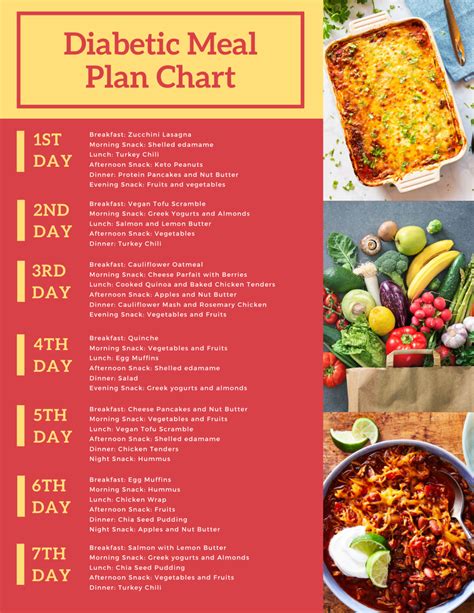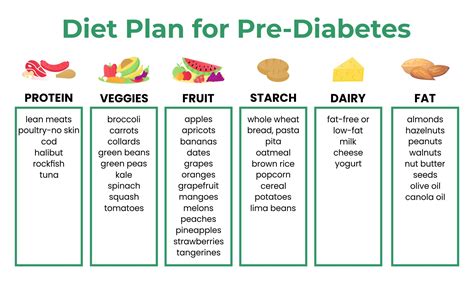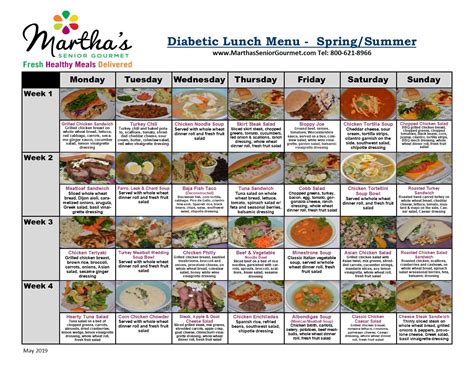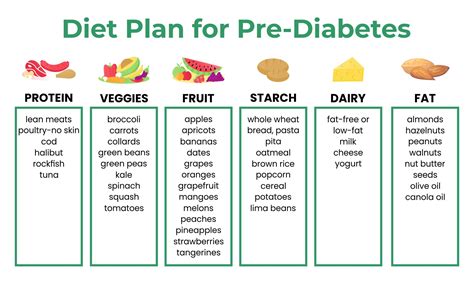Intro
Discover effective diabetic diet plans, including meal planning, glucose control, and healthy eating tips to manage diabetes and improve overall well-being with personalized nutrition strategies.
Living with diabetes requires a significant amount of planning and management, particularly when it comes to diet. A well-planned diabetic diet can help individuals manage their blood sugar levels, maintain a healthy weight, and reduce the risk of complications. With the rising prevalence of diabetes worldwide, it is essential to understand the importance of a diabetic diet plan and how it can be tailored to meet individual needs. In this article, we will delve into the world of diabetic diet plans, exploring their benefits, mechanisms, and practical applications.
A diabetic diet plan is not just about cutting out sugary foods and drinks; it is about adopting a balanced and sustainable eating approach that takes into account the individual's lifestyle, preferences, and nutritional requirements. By making informed food choices, individuals with diabetes can better manage their condition, improve their overall health, and enhance their quality of life. Whether you are living with type 1 or type 2 diabetes, a well-structured diet plan can help you achieve your health goals and reduce the risk of complications.
The importance of a diabetic diet plan cannot be overstated. By managing blood sugar levels through dietary changes, individuals with diabetes can reduce their risk of developing complications such as heart disease, kidney damage, and nerve damage. A diabetic diet plan can also help with weight management, which is essential for individuals with type 2 diabetes. Furthermore, a well-planned diet can improve overall health and well-being, increasing energy levels and reducing the risk of illnesses. With the right guidance and support, individuals with diabetes can develop a personalized diet plan that meets their unique needs and helps them achieve their health goals.
Understanding Diabetic Diet Plans

To develop an effective diabetic diet plan, it is essential to understand the fundamentals of nutrition and how different foods affect blood sugar levels. Carbohydrates, proteins, and fats are the three main macronutrients that provide energy and support growth and repair. Carbohydrates have the most significant impact on blood sugar levels, as they are broken down into glucose during digestion. Understanding the glycemic index (GI) of different foods can help individuals with diabetes make informed choices about the carbohydrates they consume. The GI is a measure of how quickly a food raises blood sugar levels, with high-GI foods causing a rapid increase in blood sugar.
Key Components of a Diabetic Diet Plan
A comprehensive diabetic diet plan should include several key components, including: * A balance of carbohydrates, proteins, and fats * A variety of whole, unprocessed foods such as fruits, vegetables, whole grains, lean proteins, and healthy fats * Limited intake of added sugars, saturated fats, and refined carbohydrates * Regular meal times and portion control to manage blood sugar levels and prevent overeating * Adequate hydration and physical activity to support overall health and well-beingBenefits of Diabetic Diet Plans

The benefits of a well-structured diabetic diet plan are numerous and well-documented. Some of the most significant advantages include:
- Improved blood sugar control and reduced risk of complications
- Weight management and reduced risk of obesity-related illnesses
- Increased energy levels and improved overall health and well-being
- Reduced risk of heart disease, kidney damage, and nerve damage
- Improved mental health and reduced risk of depression and anxiety
Practical Applications of Diabetic Diet Plans
In practical terms, a diabetic diet plan can be applied in various ways, depending on the individual's lifestyle, preferences, and nutritional requirements. Some examples include: * Meal planning and preparation to ensure a balance of carbohydrates, proteins, and fats * Keeping a food diary to track food intake and monitor blood sugar levels * Working with a registered dietitian or healthcare provider to develop a personalized diet plan * Incorporating physical activity and exercise into daily routine to support overall health and well-beingTypes of Diabetic Diet Plans

There are several types of diabetic diet plans, each with its own unique characteristics and benefits. Some of the most common types include:
- The American Diabetes Association (ADA) diet, which emphasizes a balance of carbohydrates, proteins, and fats
- The Mediterranean diet, which focuses on whole, unprocessed foods and healthy fats
- The ketogenic diet, which is high in fat and low in carbohydrates
- The vegan diet, which excludes animal products and focuses on plant-based foods
Choosing the Right Diabetic Diet Plan
Choosing the right diabetic diet plan depends on various factors, including the individual's lifestyle, preferences, and nutritional requirements. Some questions to consider when selecting a diet plan include: * What are my health goals, and how can a diet plan help me achieve them? * What are my dietary preferences, and how can I incorporate them into a diet plan? * What are my nutritional requirements, and how can I ensure I am meeting them through a diet plan? * How can I work with a healthcare provider or registered dietitian to develop a personalized diet plan?Common Foods in Diabetic Diet Plans

A well-structured diabetic diet plan should include a variety of whole, unprocessed foods that provide essential nutrients and support overall health. Some common foods in diabetic diet plans include:
- Fruits such as berries, citrus fruits, and apples
- Vegetables such as leafy greens, broccoli, and bell peppers
- Whole grains such as brown rice, quinoa, and whole wheat bread
- Lean proteins such as chicken, fish, and tofu
- Healthy fats such as avocado, nuts, and seeds
Food Safety and Diabetic Diet Plans
Food safety is an essential aspect of any diet plan, particularly for individuals with diabetes. Some tips for ensuring food safety include: * Handling and storing food properly to prevent contamination * Cooking food to the recommended internal temperature to prevent foodborne illness * Avoiding high-risk foods such as raw or undercooked meat, poultry, and seafood * Washing hands frequently to prevent the spread of illnessManaging Blood Sugar Levels through Diabetic Diet Plans

Managing blood sugar levels is a critical aspect of any diabetic diet plan. Some strategies for managing blood sugar levels include:
- Monitoring blood sugar levels regularly to track progress and make adjustments as needed
- Adjusting carbohydrate intake to manage blood sugar levels
- Incorporating physical activity and exercise into daily routine to support overall health and well-being
- Working with a healthcare provider or registered dietitian to develop a personalized diet plan
Common Challenges and Solutions
Common challenges faced by individuals with diabetes include: * Difficulty managing blood sugar levels * Struggling with food cravings and portion control * Feeling overwhelmed or frustrated with diet plans * Lacking support or resources to manage diabetesSolutions to these challenges include:
- Working with a healthcare provider or registered dietitian to develop a personalized diet plan
- Keeping a food diary to track food intake and monitor blood sugar levels
- Incorporating physical activity and exercise into daily routine to support overall health and well-being
- Seeking support from friends, family, or support groups to manage diabetes
Conclusion and Next Steps

In conclusion, a well-structured diabetic diet plan is essential for managing blood sugar levels, maintaining a healthy weight, and reducing the risk of complications. By understanding the fundamentals of nutrition, incorporating whole, unprocessed foods, and managing blood sugar levels, individuals with diabetes can develop a personalized diet plan that meets their unique needs and supports overall health and well-being. We encourage readers to share their experiences and tips for managing diabetes through diet and lifestyle changes. Please comment below with your thoughts and questions, and don't forget to share this article with friends and family who may benefit from this information.
What is a diabetic diet plan, and how can it help manage diabetes?
+A diabetic diet plan is a personalized eating approach that helps individuals with diabetes manage their blood sugar levels, maintain a healthy weight, and reduce the risk of complications. By making informed food choices and incorporating physical activity and exercise, individuals with diabetes can better manage their condition and improve their overall health and well-being.
What are the key components of a diabetic diet plan?
+A comprehensive diabetic diet plan should include a balance of carbohydrates, proteins, and fats, as well as a variety of whole, unprocessed foods such as fruits, vegetables, whole grains, lean proteins, and healthy fats. Regular meal times and portion control are also essential for managing blood sugar levels and preventing overeating.
How can I develop a personalized diabetic diet plan?
+To develop a personalized diabetic diet plan, work with a healthcare provider or registered dietitian to assess your nutritional requirements, lifestyle, and preferences. They can help you create a tailored diet plan that meets your unique needs and supports your overall health and well-being.
